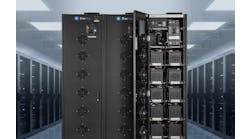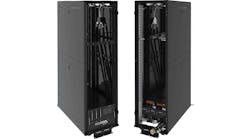Data Center Liquid Cooling Experts Colovore, ZutaCore Exemplify Trend Toward Strategic AI Unions
As the rise of artificial intelligence (AI) drives data center rack densities inexorably higher, we've seen a concurrently rising trend of M&A and strategic partnerships in the area of liquid cooling technology.
Announcements this month from high-density data center operator Colovore and liquid cooling technology provider (and notable NVIDIA partner) ZutaCore exemplify that trend.
King Street Bolsters Colovore
On May 20, global investment firm King Street Capital Management, L.P. announced its acquistion of a majority ownership stake in Colovore. The Silicon Valley-based data center operator specializes in liquid-cooled, high-density colocation for (AI) and high-performance computing (HPC) workloads.
When we last checked in with Colovore, the high-density hosting and cooling specialist was expanding in Santa Clara with a 9 megawatt data center supporting AI workloads with rack densities from 50 kW up to 250 kW.
Also operating AI data centers at locations in California and Nevada, Colovore said that under King Street’s sponsorship, it now plans to quickly scale into additional Tier 1 markets across the country.
Peter Harrison, Chief Technology Officer and Co-Founder of Colovore, said, “We founded Colovore to allow engineers from Fortune 500s to startups to seamlessly create successive waves of innovation in compute-intensive and AI-oriented services."
"Our partnership with King Street will expand our platform to many additional markets, and together we will continue to transform the data center industry and enable these emerging technologies and applications to thrive.”
As stated in a press release, the existing management team of Colovore will remain in place post-acquisition to rapidly expand the business.
Sean Holzknecht, President and Co-Founder of Colovore, remarked:
“Since 2012, we’ve been singularly focused on supporting the demanding and ever-increasing needs of modern, dense compute. We build our data centers from the ground up with robust liquid cooling to provide the most scalable power and cooling densities in our industry to optimize our customers’ deployments, reduce their TCO and ensure easy scalability."
"We look forward to working closely with our new partner King Street to quickly expand our data center footprint and support larger and more demanding customer needs created by the explosion in AI-driven workloads.”
As a result of the new transaction, the companies will leverage King Street’s deep real estate platform to support Colovore’s continued growth to meet increased demand for liquid-cooled data center solutions.
“The next-generation chips and power-dense platforms that support AI and other high-performance computing applications are quickly overwhelming legacy, air-cooled data centers,” pointed out Brian Higgins, Co-Founder and Managing Partner of King Street, adding:
“Colovore is uniquely positioned to meet the needs of these high-density customers, with a business focused exclusively on liquid-cooled data centers and over a decade of successful operating history supporting many of the leaders in the AI and HPC industries. We are thrilled to partner with the management team of Colovore and support this next phase of the company’s evolution.”
Terms of the transaction were not disclosed. DH Capital, a division of Citizens, served as exclusive financial advisor to Colovore.
Kirkland & Ellis LLP served as legal advisor to King Street, a global alternative investment firm founded in 1995 that manages more than $25 billion in assets across public and private markets.
Mark Van Zandt, Co-Head of Real Estate at King Street, concluded, “King Street’s data center investment platform is an extension of the firm’s thematic approach to global real estate investing. Working in close coordination with our colleagues in the technology and energy sectors, we bring a comprehensive and differentiated perspective to the data center industry, and look forward to working with Colovore to capitalize on this rapidly evolving investment opportunity.”
UNICOM, ZutaCore Form Strategic OEM Pact to Deliver, Cool AI Servers Globally
For its part, on May 13, ZutaCore, a provider of direct-to-chip, waterless liquid cooling technology, unveiled a strategic partnership with UNICOM Engineering.
A Dell Titanium OEM Partner and system integrator, UNICOM Engineering provides server-based application platforms and lifecycle support services for software technology developers, data center infrastructure, OEMs, and enterprises worldwide - underscoring the collaboration's global reach and impact.
The new partnership marks a crucial milestone in embedding ZutaCore's HyperCool technology into Dell Technologies' servers worldwide, starting with Dell's XE9680 platform, featuring the NVIDIA H100 and H200 GPUs, while ensuring global enterprise support and warranties for data centers at scale.
"This partnership is a significant milestone for driving ZutaCore's waterless, direct-to-chip liquid cooling into the volume market globally," said Erez Freibach, Co-founder and CEO at ZutaCore. "The future of AI hinges on the ability to deliver the performance of the next-generation GPUs, while also adhering to strong sustainable practices within the data center."
Freibach continued, "This is where ZutaCore sets itself apart from any other cooling solution with its ability to cool the hottest processors with no water used and little to no modifications to current real estate, power, or cooling systems."
Concurrently, ZutaCore announced that an unnamed "global Artificial Intelligence as a Service (AIaaS) provider/leader" has chosen the ZutaCore-equipped Dell Technologies XE9680 servers as the central platform for launching its AI services.
This landmark selection underscores the exceptional efficiency and reliability of ZutaCore's HyperCool technology, especially for high-density computing needs that AI workloads demand.
The AIaaS provider will reportedly have in-production deployments starting Q3 2024, which is expected to set a new standard for AI computing in terms of performance and sustainability, according to the partners.
In March, ZutaCore's HyperCool technology was named as one of the standout products at the NVIDIA GTC 2024 event. The technology has been proven to cool processors of 2,800 watts or more, and currently is able to support 120 kW per rack of computing power, while also increasing rack processing density by 300%, according to the company.
ZutaCore claims that its HyperCool brand as yet represents the only two-phase direct-to-chip, dielectric cooling solution with in-production deployments. The growing range servers certified to work with the HyperCool technology includes ASUS, Pegatron, and SuperMicro, as well as Dell Technologies.
Featuring a unique closed-loop system that operates at low pressure and moves large amounts of heat off the processors and away from the servers, ZutaCore contends the HyperCool platform can be implemented in new or existing data centers to deliver 10x more computing power and a 50% reduction in total cost of ownership, along with 100% heat reuse and reduced CO2 emissions for sustainability.
Founded in 1997, UNICOM Engineering is headquartered in Canton, Massachusetts with facilities in Plano, Texas; Galway, Ireland; and Manila, Philippines.
Rusty Cone, General Manager at UNICOM, said: "Leveraging UNICOM Engineering's technical expertise, global footprint, and established relationships with the industry's leading silicon manufacturers and server OEMs, specifically Dell Technologies, data center clients and partners can be assured the highest standards are being met for the integration of the ZutaCore HyperCool technology. This, along with a full fledge of warranty and uplifted services, globally, will enable the realization of a sustainable AI infrastructure capable of supporting a wide range of applications that require even the most demanding workloads and processing power."
ZutaCore Enables Direct-to-Chip Liquid Cooling for NVIDIA's GB200 Grace Blackwell Superchip
As mentioned above, and as recounted by the company's executives on a recent episode of the DCF Show Podcast, ZutaCore established its role as a major AI liquid cooling partner to NVIDIA at this spring's NVIDIA GTC 2024 event.
Fast-forward to this month at Dell Technologies World 2024 (May 20-23), when ZutaCore launched the first waterless, direct-to-chip liquid cooling cold plates for NVIDIA's GB200 Grace Blackwell Superchip.
Furnishing a single, monolithic cold plate, ZutaCore's HyperCool support for the Blackwell superchip will enable hyperscalers to harness the massive processing power of the world's most powerful AI GPU both sustainably and cost-effectively.
At Dell Technologies World, ZutaCore again showcased its dielectric cold plates to support the new Blackwell platform, featuring "an unprecedented ability to cool 120 kW of rack power with little or no modifications to current real estate, power, or cooling systems," as stated by the company.
"ZutaCore's groundbreaking technology enables us to cool the NVIDIA GB200 Superchip with a single cold plate, delivering an industry-first waterless direct-to-chip liquid cooling solution," said ZutaCore's CEO Freibach. "This breakthrough frees AI data center owners and operators from the risks associated with water-based cooling, empowering them to deploy the processing power needed for compute-intensive workloads like generative AI without the fear of leakages."
With over 400 billion transistors, the Grace Blackwell superchip features two NVIDIA Blackwell GPUs, an NVIDIA Grace CPU, and two I/O chips.
A single ZutaCore HyperCool dielectric cold plate will sit directly on top of this superchip, taking up very little space while providing significant cooling capabilities.
In a typical GB200 2RU (featuring two 2 x NVIDIA GB200 modules of 2,800 watts each) a single, monolithic ZutaCore cold plate can deliver 2,800 watts of cooling.
The monolithic cold plate ensures a simple design with only one input and one output, which reduces the potential points of failure to deliver a higher level of reliability. The module is also equipped with OCP-compliant blind mate connectors that support 5,600 kW.
Mark Nossokoff, Research Director for Hyperion Research, asserted: "The next generation of high-performance GPUs such as NVIDIA's GB200, which are required to meet the demanding needs of AI model training, will generate a significant amount of heat, making efficient cooling solutions crucial for optimal system performance and sustainable operation. Innovative cooling solutions such as ZutaCore's HyperCool waterless, direct-to-chip liquid cooling approach that eliminates the need for water in the cooling process, aim to optimize performance, maximize energy efficiency, and reduce operation costs associated with running the most advanced AI computing systems."

Matt Vincent
A B2B technology journalist and editor with more than two decades of experience, Matt Vincent is Editor in Chief of Data Center Frontier.





